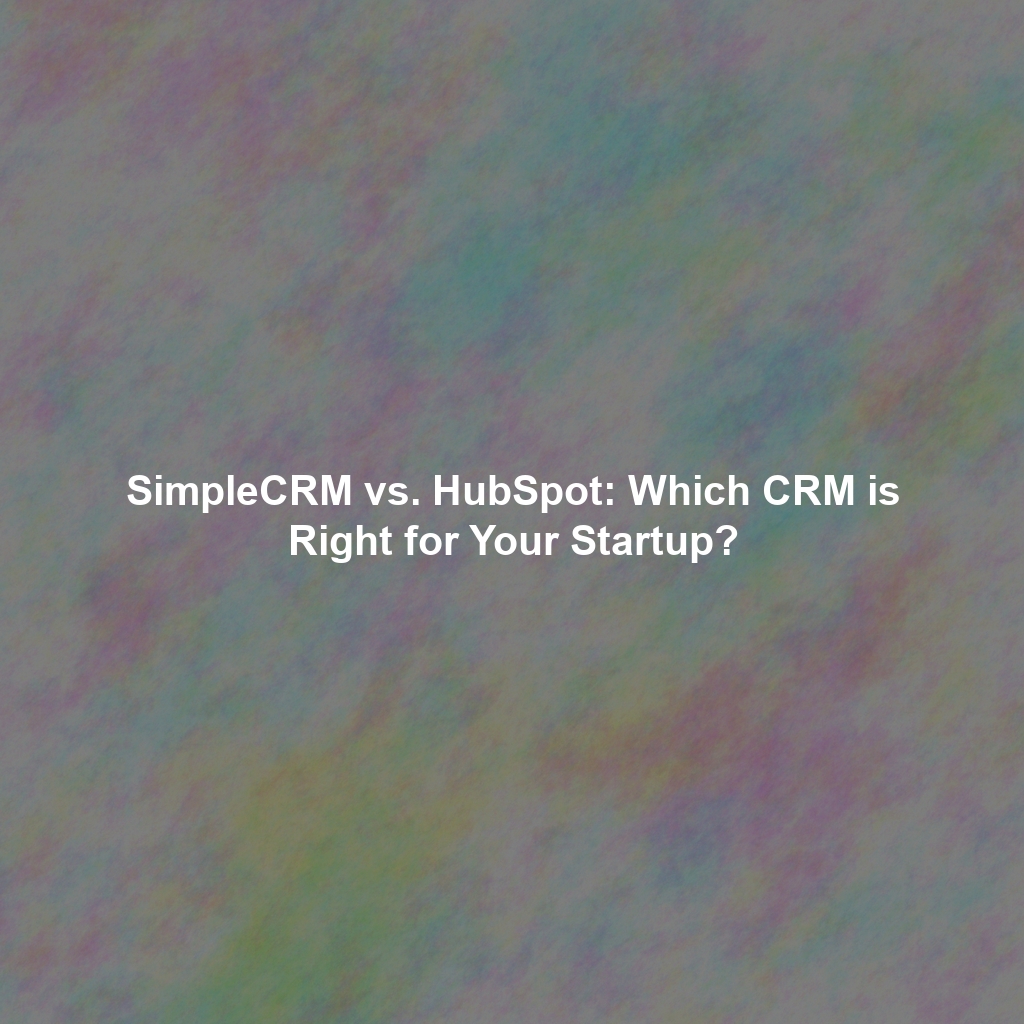SimpleCRM vs. HubSpot: Which CRM is Right for Your Startup?
Picking a CRM for your startup can feel like navigating a minefield. So many choices, all promising to be the magic bullet for your sales. You’ve probably heard about HubSpot and SimpleCRM. Both are great options, but which one actually fits *your* needs?
Let’s break down the key differences to help you decide. We’ll look at features, pricing, ease of use, and which CRM is a better fit depending on where your startup is in its journey.
Feature Comparison: SimpleCRM vs. HubSpot
HubSpot is a real powerhouse. It’s got tools for everything – marketing, sales, customer service, even a CMS. This all-in-one approach can be super powerful, but also pretty complex.
Here’s a quick look at what HubSpot offers:
- Contact Management: Really good at organizing and sorting your contacts.
- Sales Automation: Automate tasks, track deals, and manage your sales pipelines.
- Marketing Automation: Think email marketing, landing pages, and social media management.
- Customer Service Tools: Ticketing system, live chat, and a place for FAQs.
- Reporting & Analytics: Detailed reports on sales, marketing, and customer behavior.
All those features can be a double-edged sword. If you’re a small team just starting out, you might end up paying for a bunch of stuff you don’t even need yet.
Now, let’s talk about SimpleCRM. Like the name says, it’s all about keeping things simple and easy. It focuses on the essential CRM stuff most startups need: managing contacts, tracking leads, and managing your sales pipeline. It cuts out the extra stuff, so your team can get up and running fast.
Here’s what SimpleCRM does well:
- Contact Management: Easy to organize and tag your contacts.
- Lead Tracking: A visual pipeline to see where your leads are in the sales process.
- Task Management: Simple task assignments to keep everyone on track.
- Notes & Communication: Easily log calls, emails, and meeting notes.
SimpleCRM‘s simple approach makes it a great choice for startups who want a CRM that just works, without a ton of training or customization. It’s the CRM your team will *actually* use because it doesn’t feel overwhelming.
Pricing Comparison: Understanding the Costs
For startups, pricing is a big deal. HubSpot has a free version, which is a great place to start. But that free version has limits, and you’ll probably need to upgrade as you grow. HubSpot’s paid plans can get pricey, especially as you add users and features.
HubSpot’s pricing is tiered, with plans for Marketing Hub, Sales Hub, Service Hub, and CMS Hub. You can buy these separately or in a bundle. The price goes up with more contacts and users, so you’ll need to crunch the numbers carefully.
SimpleCRM takes a different route. It focuses on being affordable with a simple, clear pricing model. A huge plus is that it *never* charges per-user fees. That can save you a lot of money as your team grows. The free version gives you a lot of value, and the paid plan unlocks even more without emptying your wallet.
When you’re comparing prices, look beyond the upfront cost. Think about how it’ll scale in the future, and any hidden costs like training.
Ease of Use Comparison: Getting Up and Running Quickly
Time is precious for startups. You don’t want to spend weeks learning a complicated CRM. That’s where ease of use comes in.
HubSpot, while powerful, has a steeper learning curve. It takes time and effort to learn all its features. They have training resources, but it can be a lot to take in all at once.
SimpleCRM is great because it’s easy to use. It’s intuitive and simple, so it’s really easy to learn. You can literally get started in under 15 seconds. Because it focuses on essential CRM stuff, there are fewer distractions and less to figure out. That lets your team focus on selling, not fighting with software.
Ask yourself: How fast can my team learn this CRM? Will it need a lot of training? The easier a CRM is, the faster you’ll see results.
Best Fit for Different Startup Sizes and Needs
The “best” CRM really depends on your startup’s size, stage, and what you need.
HubSpot might be a good choice if:
- You have a bigger budget and want to invest in a comprehensive platform.
- You need advanced marketing automation, customer service, or CMS features.
- You have someone dedicated to managing and optimizing the CRM.
- You expect a lot of growth and need something that can scale easily.
SimpleCRM might be a good choice if:
- You’re a small team with a limited budget.
- You need a CRM that’s simple and easy to use, and focuses on core features.
- You want to get started quickly without a lot of training.
- You want pricing that’s affordable and transparent.
- You want a CRM that your team will actually enjoy using.
Think about what you need now and in the future. Don’t overspend on features you won’t use, but also don’t pick a CRM that’ll become useless as you grow.
Conclusion: Choosing the Right CRM for Your Startup
The CRM world can be confusing. Both HubSpot and SimpleCRM are good options, but they’re for different needs and priorities.
HubSpot is a powerful platform with a lot of features, but it costs more and takes longer to learn. SimpleCRM focuses on simplicity and affordability, with the core CRM functions most startups need.
Ultimately, the best CRM for your startup fits your budget, your team’s tech skills, and your business goals. Try free trials and demos to see what feels right. Don’t be afraid to start small and scale up later. The most important thing is to choose a CRM that helps you manage your customer relationships and grow your sales.


